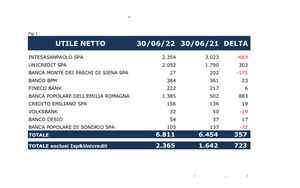(Finance) – The ten largest Italian banks in the first half of the year recorded an overall growth of 5.5% in accounting profit, compared to the same period of the previous year, reaching € 6.8 billion. This is what emerges from theanalysis by the Centro Studi Uilca Orietta Guerra on the income statements of the first half of 2022 of the ten major Italian Italian credit institutions.“Inflation and rising costs of energy and raw materials – comments the Uilca general secretary, Fulvio Furlan – they are phenomena we were no longer used to, such as the increase in interest rates that central banks have begun to make to cool down price growth. A scenario that involves the risk of strong negative impacts for families and businesses “.
Economic fragility, which could emerge due to theincrease in interest rates, is further accentuated by the uncertainties on the progress of the infection from Covid-19, still not completely eradicated, as well as other possible impacts that health and environmental emergencies could produce. “All this – he stresses Roberto Telatin, head of the Uilca Orietta Guerra Study Center – makes world trade fragile, also considering the important restrictions in China where, in the presence of a few cases of contagion from Covid-19, there are blocks in manufacturing production and commercial exchange “.
The economic results, the report highlights, were influenced by extraordinary transactions, such as thepurchase of Carige by Bper and the writedowns made by Intesa Sanpaolo and Unicredit on the assets involved in Russia’s war against Ukraine, which, however, do not seem to have an impact on the achievement of the objectives indicated in the respective business plans. The positive half-year results of the banks reflect an Italian economy that for 2022 is growing beyond expectations, as evidenced by both the IMF and the EU Commission which, while reducing the previous forecasts for 2023, have revised upwards the growth of the Domestic Product Gross. The growth in GDP has also allowed the resigning Italian government to approve new spending maneuvers without further public debt.
In the first half of 2022, i revenues of the 10 banks examined (Intesa Sanpaolo, Unicredit, Banca Monte dei Paschi di Siena, Banco Bpm, Banca Popolare dell’Emilia Romagna, Credito Emiliano, Banco Desio, Banca Popolare di Sondrio, Fineco, Carige) recorded an increase of 3.9%, both from on the interest margins (+ 7.2%), which in perspective could further grow due to the widening of the funding-lending spread, and on the commission side (+ 2.2%). “There is a need – underlines the Uilca – to invest the enormous liquidity present in the current accounts of Italians, eroded by inflation and not productive for the country, through the creation of financial products capable of giving rise to economic development, social progress and employment, inserting principles of sustainability in the banking sector and in general in the economic and financial one “.
THE costs of energy and raw materialsin addition to a negative sentiment, with a manufacturing PMI index below 50 points in July 2022, – according to the Centro Studi Uilca Orietta Guerra – will require banks to pay greater attention to credit management to avoid future growth of Non-Performing Loans, which they are decreasing thanks to the derisking policies implemented by all the banks.
The incidence of commissions and interest margin on revenues, respectively of 41.3% and 43.7%, – he says Telatin– “it will be able to produce advantages for banks due to the increase in interest rates but at the same time, in an economic context that promises to be recession or less expected growth, it will certainly have an impact on economic actors”. In this context, it should be noted that “moving the problem of NPLs outside the banking system, but in any case within the economic circle, does not resolve the indebtedness of businesses and households. It is therefore necessary to reflect on how NPLs originate and on their management, to avoid a worsening of the country’s overall debt situation “.
“We need guarantees – he concludes Furlan – for how these processes are carried out, which must not be subject to outsourcing by the banks, with a mere logic of cost cutting, and in any case must remain in the sector, with the application of the Credit Agreement to male and female workers that carry them out “.
